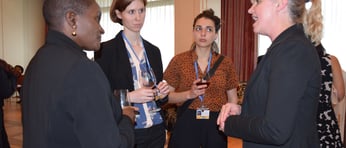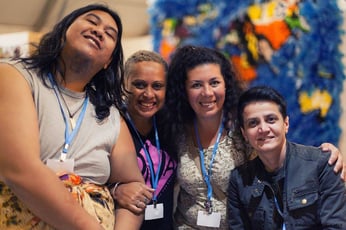Impact Story
Jun 8, 2015

GERMANY (June 3, 2015) – WEDO, on behalf of the Women Delegates Fund and the Global Gender and Climate Alliance (GGCA), in partnership with the United Nations Institute for Training and Research (UNITAR), co-hosted a side event entitled ‘Women’s Leadership in Climate Diplomacy Networking Reception’. The reception discussed the progress and gaps in advancing women’s leadership […]
GERMANY (June 3, 2015) – WEDO, on behalf of the Women Delegates Fund and the Global Gender and Climate Alliance (GGCA), in partnership with the United Nations Institute for Training and Research (UNITAR), co-hosted a side event entitled ‘Women’s Leadership in Climate Diplomacy Networking Reception’.
The reception discussed the progress and gaps in advancing women’s leadership in climate change policy making and in international diplomacy more broadly. The event was opened by Ms. Bridget Burns (WEDO) and Ms. Emily Fraser (UNITAR) who highlighted the importance of spaces, such as the Women Delegates Fund, for full and inclusive participation.
Ms. Anniete Cohn-Lois, Negotiator for the Dominican Republic and WDF Participant, facilitated the session and noted the need for training and capacity building for women leaders, and that true representation requires more than simply bringing women to have “seats at the table”. Cohn-Lois celebrated the advancements in women’s participation, in all levels of leadership noting that in the last 7 years women’s participation as members of nation delegations to the UNFCCC has steadily increased, from 33% in 2008 to 38% in 2014. Further, women’s participation as Heads of Delegations has increased from 18% in 2008 to 26% in 2014. This highlights an important shift in enhancing women’s leadership in decision-making in this process. Despite such leaps in women’s leaderships, she professed that obstacles still remained. She emphasised that women’s participation in Eastern and Western Europe, for example, was still around 42%, while it was around 21% in Africa and the Asia-Pacific region. Cohn-Lois then called on the panelists to share their views on both the progress and gaps and why enhancing equitable participation in negotiations is important for the overall objective of climate change policy.
Below is a short summary of inputs from each of our speakers:
Ms. Kalyani Raj, from the All India Women’s Conference/ Women and Gender Constituency spoke on the importance of bridging the gaps of women’s leadership in science and technology and her experience in training women in using renewable energy. She expressed that numbers meant a lot more to her than numbers; numbers mean more influence. Further, she expanded that in her own personal experience participation in such forums has allowed her to bring the local voice to global level. On the local level, training women in renewable energy has enhanced their self-esteem and has allowed them an access to a sustainable income.
Ms. Verona Collates, from UN Women, spoke on UN Women’s work to bridge the gaps in women leadership. She expanded on the role of UN Women in facilitating and supporting other organisations to implement change on the ground. Despite progress, she reiterated that she continued to see the same gaps in women’s leadership across the board of diplomacy.
Ms. Fleur Newman from the UNFCCC commented on why equal voice and representation is crucial to a successful outcome in Paris. She expressed that parties have recognized through their decisions, including Doha and the LWPG, that participation of women in the process is an important first step. However, this is the first of a number of steps and it is equally important to gain the benefits of women’s diverse knowledge and experience in decision-making under the process.
Resources such as the UNITAR leadership programme for women climate diplomats and negotiators is a great example of a tool for Parties to help achieve their goal. In this transition from one phase of the process to the next, it will be important to ensure, she reminded, that all contributions, including women’s voices, are fully harnessed, building on the momentum of the LWPG.
Resources

Support Our Work
Your donation provides us with the stable foundation we need to build the feminist future we’re working to realize.
Donate Today